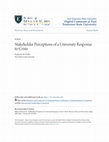Papers by Katherine Kelley

The purpose of this study was to contribute to current theory-driven research in crisis communica... more The purpose of this study was to contribute to current theory-driven research in crisis communication by examining the perceptions of multiple stakeholder groups to a university crisis response strategy. Two main questions were examined in this dissertation. The first
question attempted to determine if a significant difference existed between stakeholder groups and their perception of university reputation, responsibility for the crisis, and potential supportive
behaviors toward the university following the university’s response to a crisis. The second asked if Coombs’s Situational Crisis Communication Theory is a practical application for universities.
The participants were from 4 stakeholder groups associated with a regional public university: students, faculty, staff, and alumni. An online survey was sent to participants via email.
The data analysis revealed significant differences in the perceptions of reputation and in the potential supportive behaviors between staff and faculty and between staff and students. Staff perceived the reputation more favorably and had more favorable potential supportive behaviors
than both the faculty and the student stakeholder groups. The results of this research provided empirical evidence that distinct stakeholder groups do perceive crisis response strategies differently. It also supported the application of Situational Crisis Communication Theory in a university setting.






Uploads
Papers by Katherine Kelley
question attempted to determine if a significant difference existed between stakeholder groups and their perception of university reputation, responsibility for the crisis, and potential supportive
behaviors toward the university following the university’s response to a crisis. The second asked if Coombs’s Situational Crisis Communication Theory is a practical application for universities.
The participants were from 4 stakeholder groups associated with a regional public university: students, faculty, staff, and alumni. An online survey was sent to participants via email.
The data analysis revealed significant differences in the perceptions of reputation and in the potential supportive behaviors between staff and faculty and between staff and students. Staff perceived the reputation more favorably and had more favorable potential supportive behaviors
than both the faculty and the student stakeholder groups. The results of this research provided empirical evidence that distinct stakeholder groups do perceive crisis response strategies differently. It also supported the application of Situational Crisis Communication Theory in a university setting.
question attempted to determine if a significant difference existed between stakeholder groups and their perception of university reputation, responsibility for the crisis, and potential supportive
behaviors toward the university following the university’s response to a crisis. The second asked if Coombs’s Situational Crisis Communication Theory is a practical application for universities.
The participants were from 4 stakeholder groups associated with a regional public university: students, faculty, staff, and alumni. An online survey was sent to participants via email.
The data analysis revealed significant differences in the perceptions of reputation and in the potential supportive behaviors between staff and faculty and between staff and students. Staff perceived the reputation more favorably and had more favorable potential supportive behaviors
than both the faculty and the student stakeholder groups. The results of this research provided empirical evidence that distinct stakeholder groups do perceive crisis response strategies differently. It also supported the application of Situational Crisis Communication Theory in a university setting.